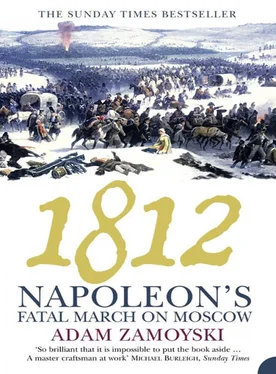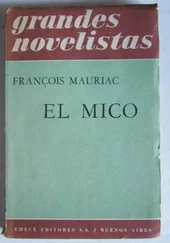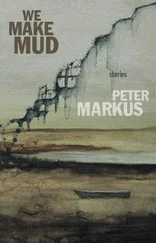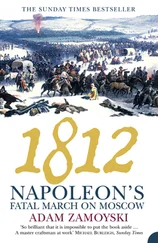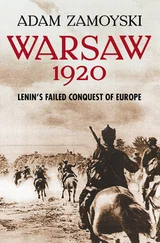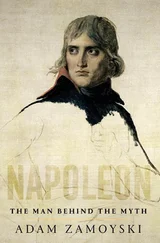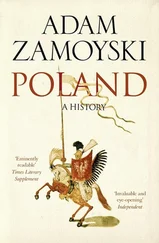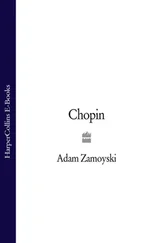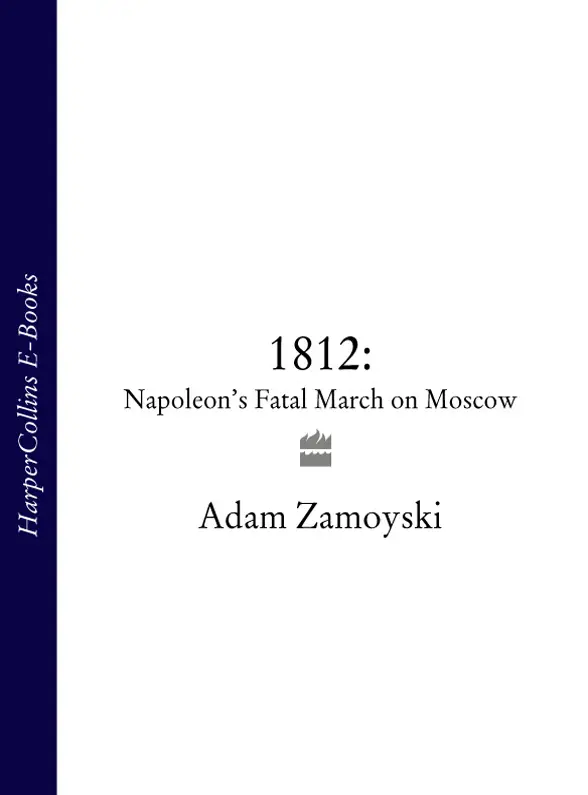
1812
Napoleon’s Fatal March on Moscow
ADAM ZAMOYSKI

Europe in 1811
Russia’s expansion in the west, 1772–1812
The Russian Armies of the West
French and Russian dispositions in June 1812
The French advance
The advance to Vitebsk
The Rudnia offensive and Napoleon’s Smolensk manoeuvre
The battle for Smolensk
Lubino – Valutina Gora
The Russian positions at Borodino
Borodino. The morning attacks
Borodino. The final assault
Kutuzov’s retreat from Moscow
Maloyaroslavets
The retreat
The view from Smolensk
Krasny, 15–16 November
Krasny, 16 November
Krasny, 17–19 November
The closing trap, 21 November
The Berezina manoeuvre
The Berezina crossing
The strategic situation at the beginning of December
Statistical chart showing the outward march and retreat of all the forces which crossed the Niemen
Cover
Title Page
Maps
Select Glossary of Place-Names in the Former Polish Lands of the Russian Empire
Introductory Note
1 Caesar
2 Alexander
3 The Soul of Europe
4 The Drift to War
5 La Grande Armée
6 Confrontation
7 The Rubicon
8 Vilna
9 Courteous War
10 The Heart of Russia
11 Total War
12 Kutuzov
13 The Battle for Moscow
14 Hollow Triumph
15 Stalemate
16 The Distractions of Moscow
17 The March to Nowhere
18 Retreat
19 The Mirage of Smolensk
20 The End of the Army of Moscow
21 The Berezina
22 Empire of Death
23 The End of the Road
24 His Majesty’s Health
25 The Legend
Plates
Notes
Sources
Index
About the Author
Reviews
Praise
By the Same Author
Copyright
About the Publisher
Select Glossary of Place-Names in the Former Polish Lands of the Russian Empire
Babinovitse: Babinowicze (Polish), present-day Babinavicy (Belarus)
Berezina: Berezyna (Polish), present-day Bjarezina (Belarus)
Beshenkoviche: Bieszenkowicze (Polish), present-day
Bešankovicy (Belarus)
Bobr: Bóbr (Polish), present-day Bobr (Belarus)
Borisov: Borysów (Polish), present-day Barysau (Belarus)
Brest: Brzesc (Polish), present-day Brést (Belarus)
Dnieper: Dniepr (Polish), present-day Dnjapro (Belarus)
Drissa: Dryssa (Polish), present-day Verhnjadzvinsk (Belarus)
Dubrovna: Dubrowna (Polish), present-day Dubrovno (Belarus)
Dunaburg: Dzwinsk (Polish), present-day Daugavpils (Latvia)
Glubokoie: Głebokie (Polish), present-day Glybokae (Belarus)
Grodno: Grodno (Polish), Grodna (Belarus)
Kobryn: Kobryn (Polish), present-day Kobryn (Belarus)
Kovno: Kowno (Polish), present-day Kaunas (Lithuania)
Ladi: Lady (Polish), present-day Liadi (Belarus)
Loshnitsa: Łosznica (Polish), present-day Lošnica (Belarus)
Miedniki: Miedniki (Polish), present-day Medininkai (Lithuania)
Minsk: Minsk (Polish), present-day Minsk (Belarus)
Mogilev: Mohylów (Polish), present-day Magilev (Belarus)
Molodechno: Mołodeczno (Polish), present-day Maladzecna (Belarus)
Mstislav: Mscislaw (Polish), present-day Mscislav (Belarus)
Niemen (river): Niemen (Polish), present-day Nemunas (Lithuania)
Nieshviezh: Nieswiez (Polish), present-day Njasviž (Belarus)
Orsha: Orsza (Polish), present-day Orša (Belarus)
Oshmiana: Oszmiana (Polish), present-day Ašmjany (Belarus)
Ostrovno: Ostrowno (Polish), present-day Astrovna (Belarus)
Pleshchenitse: Pleszczenice (Polish), present-day Plescanicy (Belarus)
Polotsk: Polock (Polish), present-day Polack (Belarus)
Ponary: Ponary (Polish), Panarai (Lithuania)
Shvienchiany: Swieciany (Polish), present-day Svencionys (Lithuania)
Smorgonie: Smorgonie (Polish), present-day Smarhon’ (Belarus)
Studzienka: Studzienka (Polish), present-day Studenka (Belarus)
Tolochin: Toloczyn (Polish), present-day Talacyn (Belarus)
Troki: Troki (Polish), Trakai (Lithuania)
Vesselovo: Weselowo (Polish), Veselovo (Belarus)
Vilia: Wilja (Polish), present-day Neris (Lithuania)
Vilna: Wilno (Polish), present-day Vilnius (Lithuania)
Vitebsk: Witebsk (Polish), present-day Vicebsk (Belarus)
Volkovisk: Wołkowyski (Polish), present-day Vavkavysk (Belarus)
Zakrent: Zakret (Polish)
Ziembin: Ziembin (Polish), present-day Zembin (Belarus)
Napoleon’s invasion of Russia in 1812 was one of the most dramatic episodes in European history, an event of epic proportions, etched deeply in the popular imagination. I only had to mention the subject of this book for people to come to life, stirred by recollections of Tolstoy’s War and Peace , by the scale of the tragedy, by some anecdote that had lodged itself in their memory, or just a mental image of snowbound Napoleonic tragedy. But the flash of recognition was almost invariably followed by an admission of total ignorance of what had actually happened and why. The reasons for this curious discrepancy are fascinating in themselves.
No other campaign in history has been subjected to such overtly political uses. From the very beginning, studies of the subject have been driven by a compulsion to interpret and justify that admits of no objectivity, while their sheer volume – over five thousand books and twice as many articles published in Russia alone in the hundred years after 1812 – has helped only to cloud the issue. 1
This was to be expected, considering what was involved. There were great reputations at stake: those of Napoleon, of Tsar Alexander, of Field Marshal Kutuzov, to name only the obvious ones. There was also a need to make sense of the whole business, for this war, unprecedented in the history of Europe in both scale and horror, was not easy to assess in military terms. The action was often confused. Both sides claimed victory in every engagement. And if the French had lost the campaign, the Russians could hardly be said to have won it. At the same time, people on both sides had behaved with a savagery that neither nation wished to contemplate.
In France, early attempts at a balanced study were complicated by political factors: the regime which replaced Napoleon’s soon after the events required anything to do with him to be represented in the most negative terms. Censorship also played a part in Russian assessments, for more complex reasons. The events of 1812 and their aftermath raised questions about the very nature of the Russian state and its people, and, as the historian Orlando Figes nicely puts it, ‘the nine-teenth-century quest for Russian nationhood began in the ranks of 1812’. 2
This quest was innately subversive of the Tsarist system, and led in the first place to the Decembrist Rising of 1825. It was pursued, along divergent paths, by those who sought a more modern Russia integrated into the mainstream of Western civilisation, and by the slavophiles, who rejected the West and all it stood for, seeking instead a truly ‘Russian’ way. The events of 1812 were used by both sides to back up their arguments, rapidly attaining mythological status and becoming increasingly distorted as a result. This dualism was only complicated with the advent of Marxism.
Читать дальше
